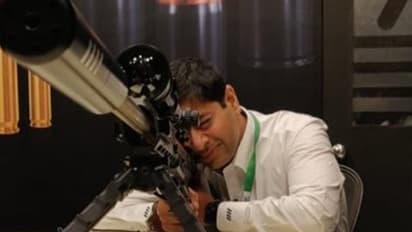'What about Make in India?': Sig Sauer's rival SSS Defence challenges Govt, Army over 73k Sig-716 rifles deal

Synopsis
The recent announcement by US-based firearms manufacturer Sig Sauer Inc, which involves supplying an additional 73,000 Sig-716 assault rifles to the Indian Army, has sparked a heated response from Bengaluru-based SSS Defence.
The recent announcement by US-based firearms manufacturer Sig Sauer Inc, which involves supplying an additional 73,000 Sig-716 assault rifles to the Indian Army, has sparked a heated response from Bengaluru-based SSS Defence. The company's CEO, Vivek Krishnan, has publicly criticised the Indian government's “Make-in-India” initiative and called into question the decision to procure more foreign-made rifles rather than supporting domestic arms manufacturing.
In a detailed post on X (formerly Twitter), Krishnan expressed frustration over the perceived neglect of Indian-made weapons. He challenged the Indian Army to put indigenous weapons from SSS Defence against global benchmarks for testing, advocating for transparent and open evaluation similar to practices followed by other serious armies.
"Here’s the challenge - We’ve heard from the buyer for a long time that “we’re not there on metallurgy” or “our designs are behind time”. I say put an indigenous weapon of ours against a global benchmark in each caliber and test out. Make the results open like real serious armies do. Test protocols are clearly defined. It would be the best for both sides. How difficult is that?" Krishnan said.
Krishnan's comments follow the Indian government's decision to order an additional 73,000 Sig-716 rifles from Sig Sauer Inc. This latest order comes after an initial purchase of 72,400 rifles in 2019, which were distributed to various branches of the Indian armed forces. Specifically, 66,400 rifles were allocated to infantry troops stationed at the Line of Control (LoC) with Pakistan and the Line of Actual Control (LAC) with China. The Indian Air Force and Indian Navy received 4,000 and 2,000 rifles, respectively.
SSS Defence's CEO criticised the procurement decision, suggesting that the defence ministry could have sought more opportunities for private Indian firms to present competitive indigenous solutions.
"I wish the govt had not acquired more of these. A private solicitation and insistence on Indian design and content would’ve easily thrown up a contender or many in fact. Testing the same against the in service system would’ve been rather easy," he remarked.
Krishnan also addressed the broader implications for India's defence sector, stating that despite the setback, SSS Defence is committed to remaining in the business and expanding globally.
"Now that it’s done, what can we do right. Most others would disband. Not us @sssdefence. We made a decision a long while ago to be the most fearless dog in this business. We shall still have a weapon for each caliber and the user to us is still the man in uniform. We will be global," he asserted.
Reflecting on the “Make-in-India” campaign, Krishnan expressed scepticism about its impact on the defence sector. He noted the challenges faced by Indian manufacturers and highlighted a need for more support and patience to develop indigenous weapons.
"What about Make in India for defence ? There are a handful of guys really doing good work in the small arms space. There’s commitment from them and all it’ll take is patience. With our neighbourhood, only a fool can imagine doing without indigenous weapons. They’ll have to come and buy from us," he stated.
Krishnan also touched upon national pride in Indian-made products, criticising past failures in the government's controlled space and expressing optimism about the private sector's role in reclaiming that pride.
"What about pride in Indian stuff ? We lost that pride a long while ago by building sub standard weapons in the govt controlled space. If anything, the private sector is regaining some of the pride. But making good weapons & getting them accepted is a difficult task. We know since going global has taught us that. In any case, we brown skinned Indians have always found that we’re respected by our own global peers before the country wakes up. It’s a self esteem thing," he remarked.
Ravi Kumar Gupta, a former DRDO scientist, responded to Vivek Krishnan's post on X, expressing support for Krishnan's challenge and urging Indian leaders to take the issue seriously. Gupta emphasised the importance of listening to voices from the industry and giving thoughtful consideration to indigenous capabilities.
He specifically called on Prime Minister Narendra Modi and Defence Minister Rajnath Singh to address the concerns raised by Krishnan, highlighting the need for a serious evaluation of Indian-made weapons against global standards.
Gupta also challenged the Indian Army’s Directorate General of Military Operations (DGMO) to accept Krishnan’s challenge with integrity. He questioned whether the allure of imported weaponry and the associated benefits might overshadow the potential of domestic innovations.
"Well said @Viv_Krishnan. Hope our leaders esp Hon'bles @narendramodi jee and @rajnathsingh jee lend their ears and give a serious thought. Will @adgpi accept the challenge honesty (Overcoming lure of IMPORTs and Makhan Malai). "Here’s the challenge - we’ve heard from the buyer for a long time that “we’re not there on metallurgy” or “our designs are behind time”. I say put an indigenous weapon of ours against a global benchmark in each caliber and test out. Make the results open like real serious armies do. Test protocols are clearly defined. It would be the best for both sides. How difficult is that?" The only difficulty I presume is the lure of Makhan Malai," Gupta remarked.
Stay updated with the Breaking News Today and Latest News from across India and around the world. Get real-time updates, in-depth analysis, and comprehensive coverage of India News, World News, Indian Defence News, Kerala News, and Karnataka News. From politics to current affairs, follow every major story as it unfolds. Download the Asianet News Official App to stay informed anytime, anywhere.